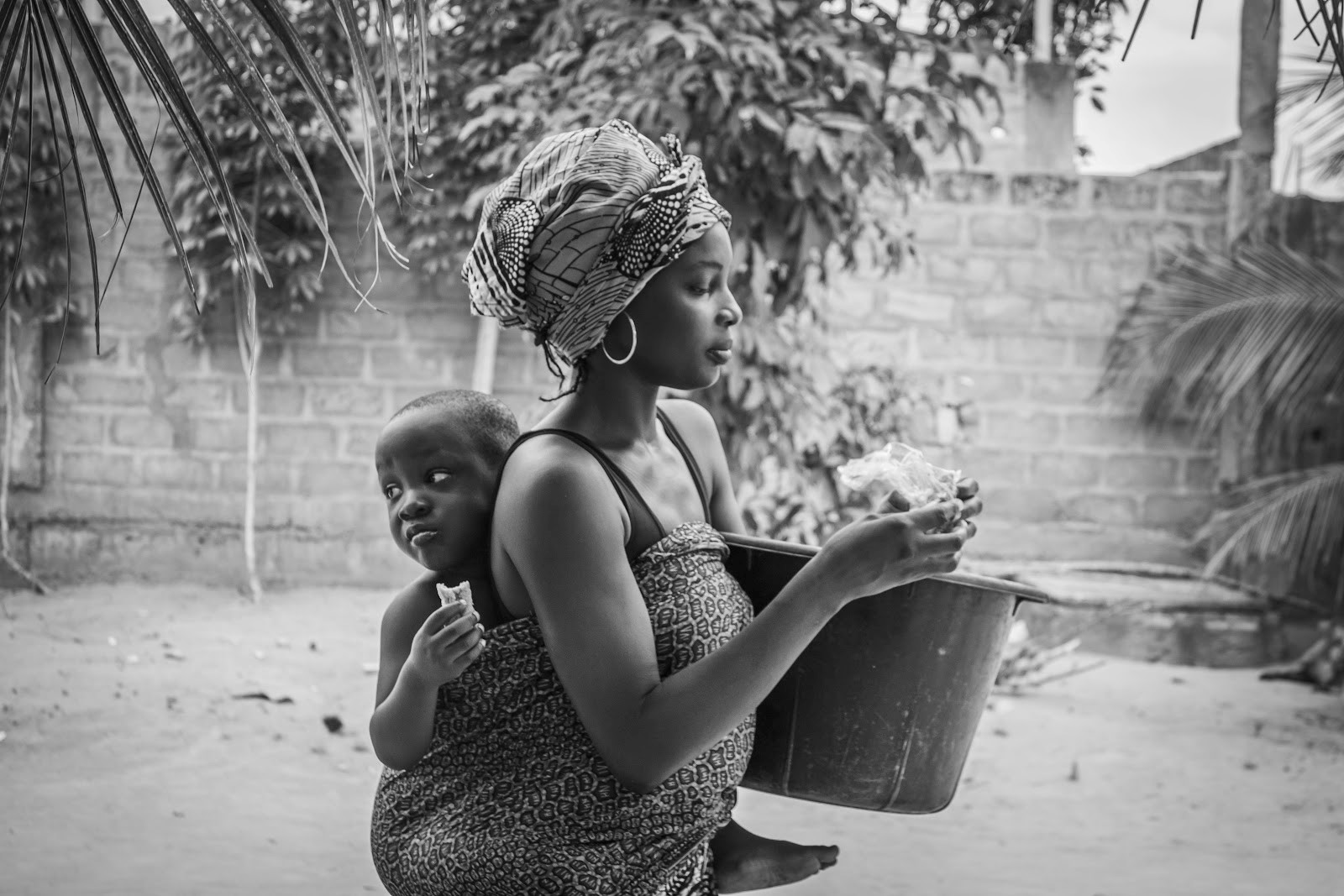Postnatal Care Is Essential For Every New African Mother and Baby
By Chika Jones, RN, RM, RPHN, BNSC, Freelance Health Writer. Medically reviewed by A. Odutola, MB.BS, PhD.

Aclose up side view of an African mother carrying her child on her back. Source: Pexels
Did you know that 65% of mothers globally die after childbirth wthin the first 42 days and their newborn babies are affected too? In low-resource countries of sub-Saharan Africa, maternal death is 15 times higher than in developed countries [1].
Babies born in Sub-Saharan Africa are also 10 times more likely to die within the first seven days than babies in developed countries [2].
The first 42 days after a woman delivers are important for her overall well-being and that of her baby. This is why the goal of postnatal care is to promote the physical and mental well-being of the mother and the entire family, as well as the physical well-being of the newborn. Lack of postnatal care services could result in poor health outcomes for the mother and her baby.
This article will educate you on postnatal care, its components, benefits, challenges and solutions to access for African women.
Postnatal care is care rendered to the mother and baby from delivery till 6 weeks. It is a vital period for the delivery of all the physical, social, and mental support the mother and her baby would need for their health and well-being [3]. This period also marks a return of the mother's hormonal and other reproductive processes, and there may be complications if proper care isn't given.
Info poster explaining what postnatal care is. Click on image to enlarge.
Postnatal care commences immediately after the baby is born. It aims to identify and address potential problems that may affect the health and well-being of the mother. It safeguards the mother and baby from preventable complications including death during the first few days after birth.
This is why mothers are advised to give birth in a healthcare facility to receive professioanl postnatal care immediately for at least 24 hours [4]. However, studies show that even mothers who gave birth in a healthcare facility may not receive appropriate postnatal care. They only spend a few hours and request to be discharged home instead of staying the full 24 hours.
Table 1: Showing recommended postnatal schedule. Click on image to enlarge
WHO guidelines recommend that both mother and baby have at least four postnatal care visits (see table 1)
The broader aims of postnatal care is not limited to the mother and her baby. It seeks to support women, fathers, caregivers, and the community. The following are components of postnatal care services that are necessary to render.

Close up of an African mother sitting beside a window and holding her baby. Image source: Freepik
Mothers are taught how to breastfeed their child, the position they should stay in, and how to latch the baby correctly for breastfeeding.
The mother should be taught the danger signs, which could be vaginal bleeding, breast engorgement or infection, confusion, difficulty with breathing, high temperature, severe pain, loss of consciousness, foul-smelling vaginal discharge, etc., and advised on seeking prompt professional help.
The mother is advised on which family planning options to consider. Family planning gives the mother time for her body to rest and recuperate for at least a year.
Studies show that family planning after delivery can prevent about 30% of maternal deaths and 10% of child deaths if couples space their pregnancies more than 2 years apart. On the other hand, closely spaced pregnancies of less than a year increase the risk of preterm birth, low birth weight, and small-for-gestational-age babies.
The mother's physical health is assessed clinically and through various tests, e.g., blood pressure, blood sugar, and urine test. These tests are conducted at each postnatal visit. The screenings allow healthcare professionals to monitor the new mother’s overall health and well-being.
She is also assessed for signs of mental illness. Pregnant and postpartum women often experience mental health issues like depression and anxiety [5].
The mother is counseled on the culture appropriate diet that promotes her well being and that of her baby through breastfeeding. She may be given oral iron supplementation to prevent postpartum anaemia if considered needed. She is also encourage to be physically active and taught exercises to aid recovery of her pelvic floor. This is to prevent such postpartum complications as urinary incontinence and uterine prolases.
The baby's weight is monitored regularly to ensure proper growth and feeding. Physical examinations, such as weighing the baby, help to assess the baby's health and well-being. Additionally, the baby is given immunisations on scheduled dates.
The baby is checked for any signs that could affect their health. Those signs can include high or low body temperature, fast breathing, baby not feeding well, and yellow palms and soles (signs of jaundice).
The mother should be encouraged to exclusively breastfeed her baby's for the first six months. Studies reveal that exclusive breastfeeding reduces the death and illness of newborn in the first month of their life.
Mothers and their newborn babies should be given care in a health facility for at least 24 hours after vaginal birth.
Before dicharge from a healthcare facility, healthcare providers need to assess:
Home visits for welfare checks on the new mother and her baby by skilled health workers during the first 7 days after birth should be conducted. Where this is impractical for whatever reason, outpatient clinic visits is to be recommended.
Postnatal care is eesential for many reasons that inlcude the following:
Studies show that if 9 out of 10 mothers received postnatal services, 10-27% newborn deaths in sub-Saharan Africa could be prevented
Postnatal care in Africa is important for the mother and her baby. However, research indicates that postnatal care services are relatively neglected in Africa. For example, in most of Sub-Saharan African countries, less than half of women who delivered in a healthcare facility received postnatal care within 2 days of childbirth, and about 1 in 8 African women who delivered at home received postnatal care within 2 days after birth.
Let's consider the factors influencing African mothers' access to postnatal services.
The mother may not be aware of postnatal care services. This can hinder her from attending postnatal care.
Studies reveal that older women use postnatal care services more compared to younger women. The reason is that older women have more experience and can decide what's best for them.
African women in urban areas have access to postnatal care services more compared to women in rural areas. Better quality health facilities for deliveries are located more in urban areas compared to rural areas.
Some African women in rural areas may not be able to afford to go to postnatal care services in urban centres due to the cost and the long distance. African women in urban areas may be focused on getting back to work for economic and career reasons.
Some husbands may not permit their wives to attend postnatal care. They may see it as a waste of time especially if the woman is not in any immediate danger.
Some African mothers believe in the use of traditional birth attendants rather than healthcare professionals. Some believe it's not safe to carry the baby outside the home until certain rites have been performed.

A mother holding her baby in the hospital. Image source: Freepik
African Mothers must be educated on postnatal care services. They must be encouraged to attend a healthcare facility. This can be done with awareness campaigns, media exposure, community awareness, etc. African women should also be educated on post-natal services.
Suitably equipped and staffed health facilities should be established in rural areas for African mothers to access at an affordable cost.
African mothers should be offered entrepreneurial training for personal income generation purposes. This will give the mother the freedom to also attend her postnatal care. African mothers working in establishments must also be offered paid time off to attend to postnatal care functions before heading back to work.
African policymakers should create policies that would benefit mothers and fathers.
For example in Abia State (one of the 36 states in Nigeria), a policy has been passed for nursing mothers to take 6 months paid maternity leave and three weeks paternity leave. Prior to this, mothers only had three months maternity leave, while fathers did not have any paternity leave. This policy would help African mothers rest well before going back to work. It would also assist fathers with the support they need to help their spouses and baby.
African fathers should be involved in mothers’ and babies' welfare. Husbands should support their wives financially and by physically attending healthcare visits with them. Health outreaches should be done to educate men on why postnatal care is important.
Conclusion
Postnatal care is essential for the baby and the mother. Healthcare professionals conduct it to ensure the mother and baby are okay. It prevents complications and deaths. Though it is needed especially in sub-Saharan Africa some factors could affect African mothers from accessing postnatal care. It’s vital that the factors are addressed and African mothers encouraged to participate in postnatal care. This creates a safe environment for the mother and her baby.
References:
1. Tessema ZT, Yazachew L, Tesema GA, Teshale AB. Determinants of postnatal care utilization in sub-Saharan Africa: a meta and multilevel analysis of data from 36 sub-Saharan countries. Italian J. of Pediatrics. 2020;46(175). Available from here
2. Eshetu HB, Aragaw FM, Negash WD, BelachewTB, Asmamaw DB, Tareke AA, et al. Assessing postnatal care for newborns in Sub-Saharan Africa: A multinational analysis. PLOS ONE. 2024 Feb 15;19(2):e0298459–9. Available from here.
3. Abdullahi HM, Usman NO.Attitude and utilization of postnatal care services among women of reproductive age in the rural and urban communities in Northern Nigeria. Calabar Journal of Health Sciences. 2022 Nov 26;(6):72–9. Available from here.
4. World Health Organization (HO). Pregnancy, childbirth, postpartum and newborn care: a guide for essential practice. [Internet]. 2015 J. 29. [Cited July 21, 225]. Available from here.
5. Awini E, Agyepong IA, Owiredu D, Gyimah L, Ashinyo ME, Yevoo LL, et al. Burden of mental health problems among pregnant and postpartum women in sub-Saharan Africa: systematic review and meta-analysis protocol. BMJ Open. 2023;13(6):e069545–5. Available from here.
Related:
Why Family Planning Is Essential To Nigerian Women Of Reproductive Age
6 Breastfeeding Tips for New African Moms
Breast Hygiene and Care During Breastfeeding: A Guide for African Women
Depression among African women
Anxiety Disorders: What Every African Woman Need to Know
Published: August 14, 2025
© 2025. Datelinehealth Africa Inc. All rights reserved.
Permission is given to copy, use and share content freely for non-commercial purposes without alteration or modification and subject to source attribution
DATELINEHEALTH AFRICA INC., is a digital publisher for informational and educational purposes and does not offer personal medical care and advice. If you have a medical problem needing routine or emergency attention, call your doctor or local emergency services immediately, or visit the nearest emergency room or the nearest hospital. You should consult your professional healthcare provider before starting any nutrition, diet, exercise, fitness, medical or wellness program mentioned or referenced in the DatelinehealthAfrica website. Click here for more disclaimer notice.